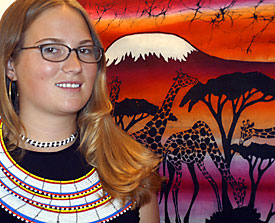 |
|
MALLORY LORING/Arizona Daily Wildcat
|
Laura Hartstone, a leader of the UA chapter of Students Global AIDS Alliance, went to Africa over the summer to educate people about AIDS.
|
|
|
By Ashley Nowe
Arizona Daily Wildcat
Friday October 17, 2003
When Laura Hartstone traveled to Tanzania, Africa, this summer as part of an AIDS awareness program, her eyes were opened to another world.
Hartstone, an environmental sciences sophomore, realized the seriousness of this worldwide epidemic when a village woman came to her, pleading for medicine for a young boy whose weakened immune system caused by advanced HIV left him with a fungal infection on his scalp.
"His head was completely covered with these scabs and it was awful looking," Hartstone recalled. "I just couldn't handle that."
Hartstone went to the village's pharmacy, expecting the medicine to cost about $20, but she found that it was only 70 cents.
"These people can't even afford a little thing of medicine," Hartsone said. "It was a real awakening."
Hartstone, along with other UA students who visited these villages, returned to Tucson and decided to take action, starting their own chapter of Student Global AIDS Campaign, a student-led organization dedicated to fighting AIDS worldwide.
"How can we come back and just dismiss what we just saw," Hartstone said. "When we came back we just really wanted to make a difference here."
SGAC members will be at the AIDS Walk, which is this Sunday at the Rillito River Park, 4502 N. First Ave., rallying students to support the cause.
"HIV has lost the lime light in America because of all the medicine that we have to prolong life, but in different places these medicines don't even exist," said molecular and cellular biology sophomore Kyle Tiemeier, who also visited Africa this summer. "We have a long way to go both here and in other countries, so it is important for people to come out and support this."
SGAC members will be at the AIDS Walk starting line at 6:30 a.m., handing out postcards that people can send to their senators asking for more AIDS funding.
The Bush Administration was supposed to give $3 billion to AIDS programs, but revised the budget, taking away about $1 billion of the funds.
A proposed amendment to the $87 billion Iraq allotment, requesting that $1 billion be returned to AIDS programs, will be voted on by the senate this week.
The money would go to AIDS education and treatment.
"It is important to educate people on AIDS," said physiology and anthropology junior Amber Rice, who also spent the summer in Africa. "In my village one out of five people had AIDS and they didn't even think it is that big of a problem."
The organization will be going back to Africa this summer and next fall, taking 20 to 25 students to continue educating the people in Tanzania. Students are not required to have extensive knowledge of AIDS.
The summer trip lasts for eight weeks and the fall trip lasts for 12 weeks; both include two weeks of intensive training on AIDS.
Students, with the help of translators, educate Tanzanians about AIDS and how to prevent it.
Students who are interested in participating should contact Laura Hartstone at 888-3479 or hartston@email.arizona.edu.
SGAC meetings are held every Monday at 5 p.m. in the science library and all are welcome.
For more information on AIDS Walk call 791-WALK.
